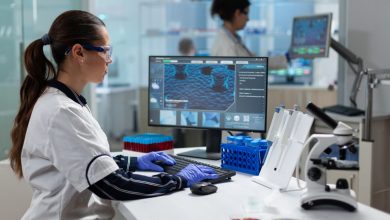NOVAS TECNOLOGIAS
Novo app ajuda a identificar doenças no campo
Novo app ajuda a identificar doenças no campo
The team behind a new mobile app that uses artificial intelligence to accurately diagnose crop diseases in the field has won a $US100,000 award to help expand their project to help millions of small-scale farmers across Africa.
Cassava brown streak disease is spreading westward across the African continent, and together with cassava mosaic disease, threatens the food and income security of over 30 million farmers in East and Central Africa. Likewise, banana is threatened by fungal and bacterial diseases including the devastating Banana bunchy top virus, while late blight still plagues potato farmers.
Farmers are often unable to properly identify these diseases, while researchers, plant health authorities and extension organizations lack the data to support them.
To stop the spread of these pests and diseases, a team under the CGIAR Research Program on Roots, Tubers and Bananas (RTB) has developed a revolutionary app to accurately diagnose diseases in the field, which will be combined with SMS services to send alerts to thousands of rural farmers.
“Smartphones are becoming more and more common in rural Africa. Smallholders or extension officers with a basic smartphone with a camera will be able to download the app for free, fire it up, point it at a leaf with disease symptoms and get an instant diagnosis. That is truly revolutionary!” explained Dr. James Legg of the International Institute of Topical Agriculture (IITA), who leads the project together with Dr. David Hughes of Penn State.
The app will also provide the latest management advice for all major diseases and pests of root, tuber and banana crops, and pinpoint the location of the nearest agricultural extension support for farmers.
The team were winners of a $US100,000 grant as part of the CGIAR Platform for Big Data in Agriculture Inspire Challenges at the Big Data in Agriculture Convention 2017 in Cali, Colombia on 21 September.
Currently developed for cassava, the grant will allow researchers to expand the app for other root, tuber and banana crops that are critical sources of food, nutrition and income security for millions.
“This prize is transformative. It allows us to expand across multiple sites in Africa and multiple crops that are critical for food security on the continent. We can amplify by 100 times what we have achieved so far,” said Dr. David Hughes of Penn State.
Painstaking field work using cameras, spectrophotometers and drones at RTB cassava field sites in coastal Tanzania and on farms in western Kenya generated more than 200,000 images of diseased crops to train artificial intelligence (AI) algorithms.
Using many of these images, Hughes, Legg and collaborators developed an AI algorithm that can automatically classify five cassava diseases, and by collaborating with Google, the team were able to develop their smartphone app with TensorFlow. It is currently being field-tested in Tanzania.
Penn State has also developed a mobile spectrophotometer through a start-up called CROPTIX. Early results suggest it can accurately diagnose different viral diseases in the field, even if the plant looks healthy.
“The app employs AI in real time so the farmer can be an active participant in disease diagnosis and crop health management, leading to more yields for smallholder farmers. It is also revolutionary because our artificial intelligence is based on the world”s best human intelligence on African crops – the research scientists at CGIAR and RTB,” added Dr. Hughes.
The project team has developed linkages with the Vodafone agriculture SMS platform called DigiFarm, which will allow them to link digital diagnostics to large-scale rural text messaging services.
The team will deliver farmer tailored SMS alerts on crop diseases and pests to 350,000 Kenyan farmers by July 2018.
The project is being carried out by a global network of scientists from IITA, Penn State, the International Institute of Tropical Agriculture (CIAT), the International Potato Center (CIP) and Bioversity International, as part of the CGIAR Research Program on Roots, Tubers and Bananas (RTB).
Agrimarketing, 02/10/2017




